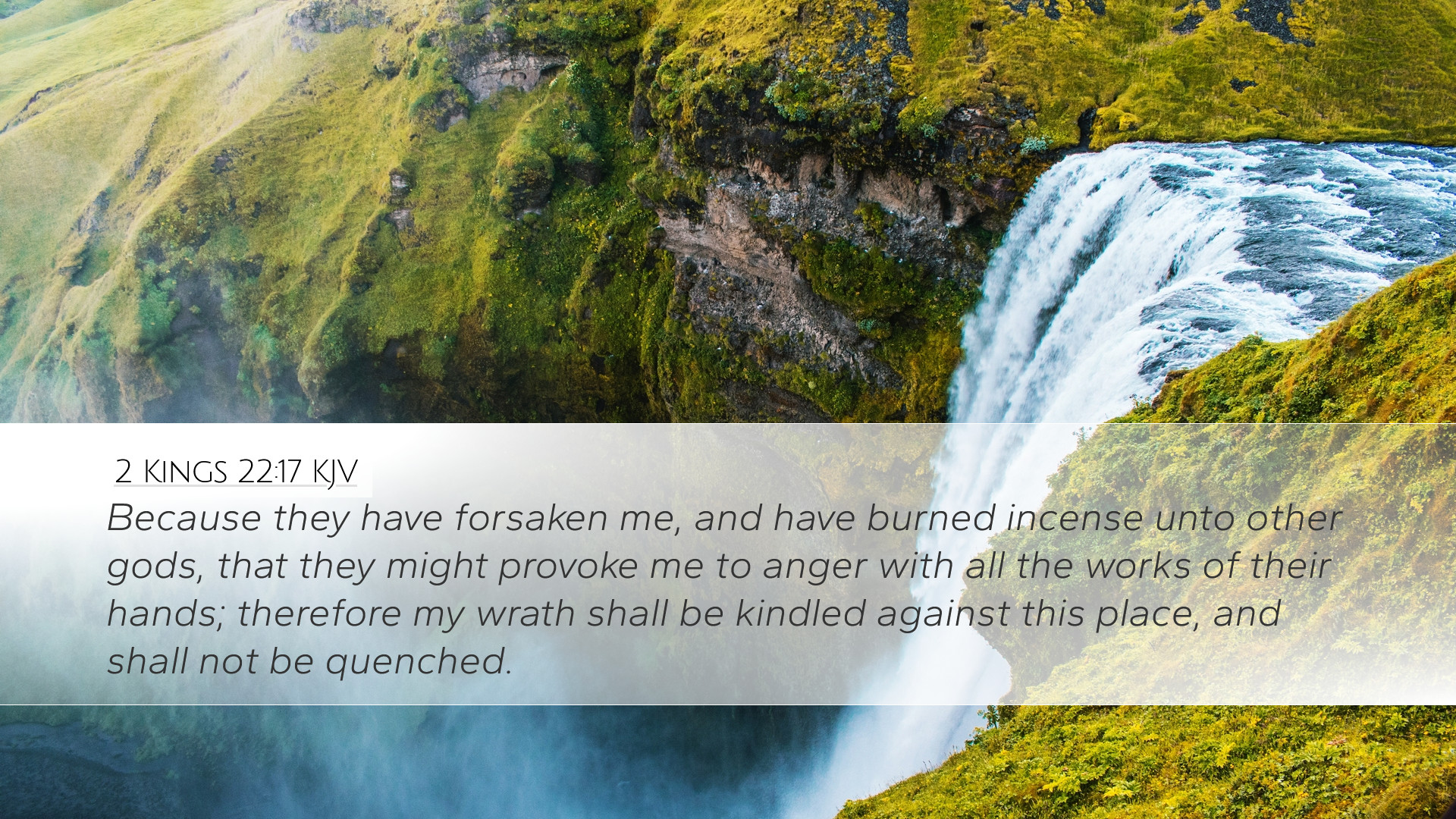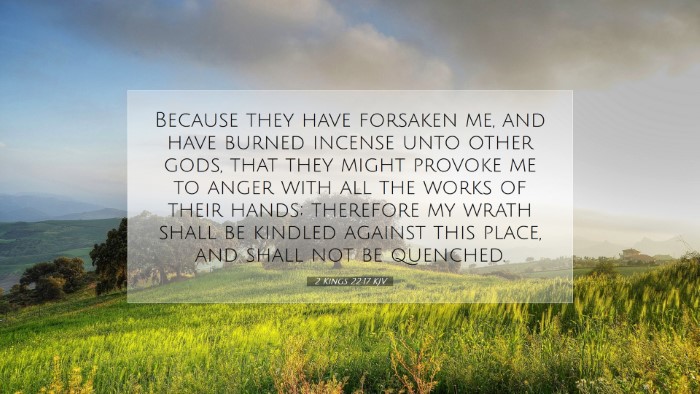Old Testament
Genesis Exodus Leviticus Numbers Deuteronomy Joshua Judges Ruth 1 Samuel 2 Samuel 1 Kings 2 Kings 1 Chronicles 2 Chronicles Ezra Nehemiah Esther Job Psalms Proverbs Ecclesiastes Song of Solomon Isaiah Jeremiah Lamentations Ezekiel Daniel Hosea Joel Amos Obadiah Jonah Micah Nahum Habakkuk Zephaniah Haggai Zechariah Malachi2 Kings 22:17
2 Kings 22:17 KJV
Because they have forsaken me, and have burned incense unto other gods, that they might provoke me to anger with all the works of their hands; therefore my wrath shall be kindled against this place, and shall not be quenched.
2 Kings 22:17 Bible Commentary
Bible Commentary on 2 Kings 22:17
2 Kings 22:17 states: "Because they have forsaken me, and have burned incense unto other gods, that they might provoke me to anger with all the works of their hands; therefore, my wrath shall be kindled against this place, and shall not be quenched." This verse serves as a profound summary of God's displeasure with Israel's idolatry and spiritual infidelity, reflecting themes of judgment, divine justice, and the consequences of turning away from God.
Historical Context
At the time of this pronouncement, the nation of Judah was facing a significant spiritual crisis. King Josiah had recently ascended to the throne, inheriting a kingdom steeped in the worship of Baal and other foreign deities. The previous leaders had led the people away from the worship of Yahweh, leading to widespread corruption and idolatry.
Theology of Judgment
The verse emphasizes the principle of divine judgment as articulated in biblical theology. According to Matthew Henry, God's judgment is a response to human sinfulness and rebellion. When His people forsake Him, they invoke His wrath through their actions. The phrase "they have forsaken me" indicates a deliberate turning away from God, which illustrates the covenantal relationship that Israel had with Yahweh—a relationship marked by loyalty and faith.
Idolatry and Spiritual Adultery
The acts of burning incense to other gods symbolize a deeper spiritual infidelity. Albert Barnes notes that the people’s worship of idols is not merely a physical act but is representative of their hearts turning away from their true Creator, provoking God to anger. This "provocation" is significant in understanding Israel’s sin; they are not merely neglecting their responsibilities but actively choosing to embrace false gods, akin to spiritual adultery.
Adam Clarke elaborates on the notion of burning incense as a form of worship. In the ancient Near East, such acts were pivotal in invoking divine favor. The choice to direct such worship towards false gods reveals not only a misplacement of reverence but a willful ignorance of God’s sovereignty and holiness. This misdeed becomes a point of contention between God and His people.
Consequences of Forsaking God
The latter portion of the verse states, "therefore, my wrath shall be kindled against this place, and shall not be quenched." This statement underscores the certainty and severity of God’s judgment. Both Henry and Barnes agree that divine wrath is depicted as unavoidable when one continually walks away from the truth of God. The emphasis on the permanence of God's wrath signifies the serious consequences faced by a people who repeatedly refuse to heed divine warnings.
The Relevance for Today
For contemporary readers, especially pastors and theologians, Clarke argues that this verse serves as a warning against complacency in worship and faith. The modern church must be vigilant against allowing secularism and idolatry to creep into the lives of believers. The urgency of returning to true worship and relationship with God is echoed through the consequences detailed in this passage.
Conclusion
In summary, 2 Kings 22:17 encapsulates the profound theological implications of idolatry and divine judgment. Historical context reveals the struggles of Judah, while the theological insights from Henry, Barnes, and Clarke illuminate the grave consequences of forsaking God. As leaders within the church, reflecting on this passage can lead to the encouragement of deeper spiritual diligence and a return to heartfelt worship of the one true God.


